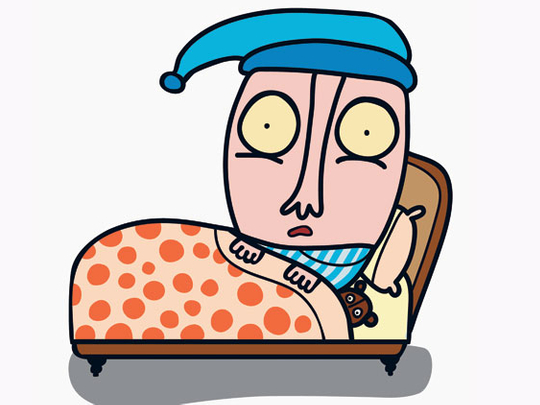
"A dream has the power to poison sleep," wrote Percy Bysshe Shelley. He could have been talking of me. Whenever someone bids me good night with a "sweet dreams", I wince. I am sure there are many people who slip into blissful reverie when they go to bed but I am not one of them.
When I was 10, I had such vivid nightmares about house fires and nuclear war (I was an anxious child) that my mother bought me worry dolls to put under my pillow. They didn't work. Twenty years on, my dreams are no sweeter. My recurring nightmares are so varied and frequent that I lose track of them. There's the one I call "the teeth-crumbling classic", in which my molars fall out, though sometimes this is replaced by the one in which I lose all my hair.
Alien attack
Last night, I was being chased around my flat by aliens (as in the Ridley Scott film), which happens several times a year and, as I am sure you can imagine, is most distressing. Then there's another in which I am forced to retake my geography A-level without having done any revision. And finally, the dream in which I find myself in a lift with no walls, falling tens of storeys to the ground, alongside people who seem not the slightest bit bothered by this turn of events.
It is this nightmare that I find myself discussing with Philippa Perry, a psychotherapist who uses dreams when working with her clients. Greeks, Romans and mystics all thought that dreams had meaning but for a long time, the majority view was that they were merely a mental dumping ground or, alternatively, a visitation from God. Then Freud came along with The Interpretation of Dreams and all that changed. Dreams are important, Perry says. "All mammals dream," she says. "If we were deprived of sleep and didn't have them, we would go mad and start dreaming when we were awake."
Some say dreams are a way of processing the day's events and recent research suggests they lower stress levels, which, in my experience, does not seem to be the case. But can they tell you more about yourself? "People sometimes ask me whether the use of dreams in therapy is nothing more than an old cliché and what use they can possibly be," Perry writes in Couch Fiction, her book about psychotherapy. "The masters were very lyrical on this point. Freud described dreams as the ‘royal road to the unconscious' and Fritz Perls called them ‘the royal road to integration'. My belief about dreams is that it is good to have a look at other parts of ourselves, from which we may be motivated and which haven't got a direct language link to our conscious side."
Perry is the wife of Turner Prize-winning artist Grayson and her house is itself a dream-like clutter of his wonderful vases amid the brightly coloured sofas and blood-red walls. She is at present hosting workshops on how to interpret dreams and so it is that I find myself there, offering up my night-time horrors for scrutiny. The first thing Perry does is tell me to take it seriously. Lots of people think dream therapy is a bit of a laugh but she explains it can open up parts of you that you didn't know existed and that it often leaves clients in tears. "Huh!" I think, "not me." But a box of tissues is on hand, just in case.
Talk therapy
I wonder if it will work much as a dream dictionary does, with Perry interpreting my nightmares, but she tells me that these dictionaries are pretty useless and written by shamans. "In my experience, the best people to define a dream are the patients themselves."
One way to do that is to talk through your dream, all the time thinking about how it makes you feel. We start with me closing my eyes and relating the dream in the present tense, as if it is happening there and then. I feel a bit silly, explaining how I get into the lift and the walls fall away as it begins to wobble — but on I go. Next, Perry asks me to relive the dream and let my imagination go, explaining details and colours and, weirdly, I am suddenly in another dream, one I have never really remembered before. In this one, I am being told to go down a set of steep stairs with no sides to them and I am scared. Other people are perfectly happy to do the same — much like the other lift passengers who aren't bothered by the fact that it is falling. Perry asks me to tell the dream again, this time imagining I am one of those people. How do I feel? Relaxed. What do I think of the girl cowering in the corner? I barely notice her. And, suddenly, I am bawling like a baby, in desperate need of those tissues. Are these feelings familiar to me? It is certainly something to think about. But I do leave her house feeling strangely cleansed. And, curiously, I haven't had that dream again since.











